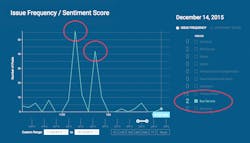Why social media should be at the core of your daily executive decision-making process.
If you’re a transit executive, you likely think of social media as something for your communications and marketing team to worry about. You probably envision them posting a cute picture and getting some Facebook likes for your page.
It’s time to dramatically change your thinking, because social media — specifically social media data — should be at the core of your daily executive decision-making process.
For the first time one day last August, 1 billion unique people logged into Facebook within a 24-hour period. That’s one in seven people on the planet. More than a billion people communicate on the social chat platform WhatsApp. Seventy-eight million Americans have Instagram accounts. I could go on with the statistics, but the point should be clear — social media is now the world’s primary communication platform.
And why should you care? Because unlike other outreach platforms like television and radio, social media gives you analysis back, in real time. In other words, not only are all of those people — many of whom are your customers — talking to one another, but those conversations yield actionable insights that can help you make better, more informed decisions every day of the year.
What did people think about your speech to the city council? In which segment of the community can you increase ridership? What do riders think of the bus or rail car I manufactured? What’s the ROI of my most recent marketing campaign? Outreach to exactly which people will give me the best ROI? How can I improve the public’s perception of my products? Is public opinion improving or deteriorating? What’s driving that change? Where are people getting their information? How can I get the right information around people causing roadblocks?
Social data, if properly understood and managed, answers these questions, and many more.
For example, one transit agency that tracks every issue its audience is discussing identified a noticeable increase in chatter on bus service on two particular days in December. Normally this would set off alarms because when large numbers of people suddenly talk about buses you must assume it’s about a service or product failure, right?
It turns out we could tell this agency in real time that the favorable sentiment of these conversations was also spiking — in a positive direction. That’s great news for the communications department, but it’s also vital intelligence for CEOs.
As a CEO you must be able to show these successes to your board and explain what drove those successes and how they can be understood and repeated. The same requirement rings true when the trends aren’t as positive.
You also shouldn’t think this applies only to public transit agency executives.
If you manage a transit manufacturing or service company, this data has the ability to improve your bottom line just as it can improve ridership for agencies. This data can tell you exactly what public pressures and incentives the agencies are responding to so you can be more responsive to their needs. Social data will tell you how people are responding to the products and services you provide, and social data will tell you exactly whom you can engage to improve your customers’ perception among the public at large. Each of these things helps make your agency customers happier and more successful, yielding more private sector business.
Marketing teams may have begun to think about these questions and opportunities, but very few of them have been given the opportunity to institute a social data system that answer all of these questions comprehensively, in real time, and in a way that is integrated throughout the organization. The fact is, social intelligence is coming to your door sooner or later. The question is, will you adopt soon and take advantage, or will you wait until you’re already behind?
The benefits of early action are significant. Simply put, executives who get better information make better decisions. Social data can provide you the intelligence you need to create enduring community coalitions, improve your organization’s efficiency, enhance support among your board members, and help you gain riders and improve the bottom line.
The benefits are undeniable, so if you’re not yet social to the core, it’s time to get there.
Scott Wilkinson is president of AlphaVu.
